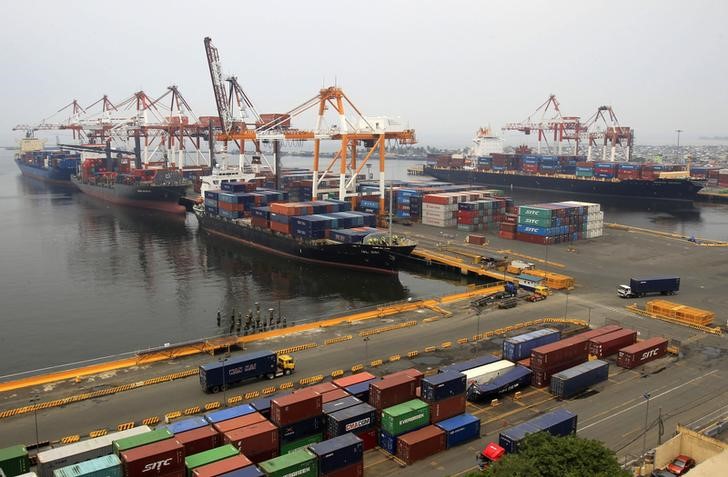By Michael Hirtzer
CHICAGO, Oct 12 (Reuters) - U.S. lumber futures LBc1
jumped 4 percent to their highest levels in a month on Monday as
inventories of the building material ran low and a nearly
decade-old trade deal with Canada expired, traders and analysts
said.
Investors and wood users who bet on lower lumber prices
following the expiration this week of the 2006 Softwood Lumber
Agreement between the United States and Canada have been
covering their short positions - in both physical supplies and
futures.
The trade deal, known as SLA, taxed lumber exported from
western Canada into the United States. The exports were taxed at
escalating rates as cash timber prices declined, making the
Canadian wood more competitive with pricier supplies produced by
U.S. saw mills.
As the deal neared its expiration and the Canadian dollar
CAD= lost value against the greenback .DXY , traders bet that
prices would decline as cheaper wood flooded across the border
in what one analyst called a "wall of wood."
It is too early to say whether that influx of lumber will
materialize. However, U.S. imports of Canadian timber in October
were on pace to be the smallest monthly volumes in at least two
years, Canadian government data showed.
"The marketplace expected a wall of wood, but my (clients)
are tight on everything," said Robin Cross, a lumber broker for
INTL FCStone in Chicago. "Funds all sold knowing the deal was
expiring, and now they're covering."
Lumber futures on the Chicago Mercantile Exchange 0#LB:
have now posted gains for six sessions in a row, and have surged
more than 18 percent since touching a roughly four-year low on
Sept. 28.
Lumber for November delivery LBX5 on Monday rose by the
daily price limit of $10 per thousand board feet, to $254.40 per
tbf.
Another analyst, who declined to be quoted by name due to
company policy, said wood prices could remain elevated for
another month, before trade between the neighboring countries
normalized.
"Purely and simply the industry misjudged their level of
activity and how much wood they would need," the analyst, based
in the U.S. Pacific Northwest, said.
- English (USA)
- English (UK)
- English (India)
- English (Australia)
- English (South Africa)
- English (Philippines)
- English (Nigeria)
- Deutsch
- Español (España)
- Español (México)
- Français
- Italiano
- Nederlands
- Português (Portugal)
- Polski
- Português (Brasil)
- Русский
- Türkçe
- العربية
- Ελληνικά
- Svenska
- Suomi
- עברית
- 日本語
- 한국어
- 简体中文
- 繁體中文
- Bahasa Indonesia
- Bahasa Melayu
- ไทย
- Tiếng Việt
- हिंदी
U.S. lumber futures surge 4 pct as trade deal with Canada expires
Published 2015-10-12, 05:15 p/m
U.S. lumber futures surge 4 pct as trade deal with Canada expires

Latest comments
Install Our App
Risk Disclosure: Trading in financial instruments and/or cryptocurrencies involves high risks including the risk of losing some, or all, of your investment amount, and may not be suitable for all investors. Prices of cryptocurrencies are extremely volatile and may be affected by external factors such as financial, regulatory or political events. Trading on margin increases the financial risks.
Before deciding to trade in financial instrument or cryptocurrencies you should be fully informed of the risks and costs associated with trading the financial markets, carefully consider your investment objectives, level of experience, and risk appetite, and seek professional advice where needed.
Fusion Media would like to remind you that the data contained in this website is not necessarily real-time nor accurate. The data and prices on the website are not necessarily provided by any market or exchange, but may be provided by market makers, and so prices may not be accurate and may differ from the actual price at any given market, meaning prices are indicative and not appropriate for trading purposes. Fusion Media and any provider of the data contained in this website will not accept liability for any loss or damage as a result of your trading, or your reliance on the information contained within this website.
It is prohibited to use, store, reproduce, display, modify, transmit or distribute the data contained in this website without the explicit prior written permission of Fusion Media and/or the data provider. All intellectual property rights are reserved by the providers and/or the exchange providing the data contained in this website.
Fusion Media may be compensated by the advertisers that appear on the website, based on your interaction with the advertisements or advertisers.
Before deciding to trade in financial instrument or cryptocurrencies you should be fully informed of the risks and costs associated with trading the financial markets, carefully consider your investment objectives, level of experience, and risk appetite, and seek professional advice where needed.
Fusion Media would like to remind you that the data contained in this website is not necessarily real-time nor accurate. The data and prices on the website are not necessarily provided by any market or exchange, but may be provided by market makers, and so prices may not be accurate and may differ from the actual price at any given market, meaning prices are indicative and not appropriate for trading purposes. Fusion Media and any provider of the data contained in this website will not accept liability for any loss or damage as a result of your trading, or your reliance on the information contained within this website.
It is prohibited to use, store, reproduce, display, modify, transmit or distribute the data contained in this website without the explicit prior written permission of Fusion Media and/or the data provider. All intellectual property rights are reserved by the providers and/or the exchange providing the data contained in this website.
Fusion Media may be compensated by the advertisers that appear on the website, based on your interaction with the advertisements or advertisers.
© 2007-2024 - Fusion Media Limited. All Rights Reserved.